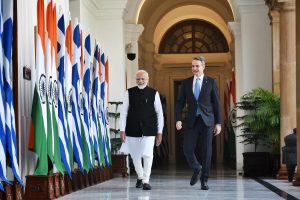In recent years, several European countries have shown a keen interest in playing a greater role in the Indo-Pacific. When the European Union came out with the Indo-Pacific strategy in 2021, it was largely driven by France, Germany, and the Netherlands, which had already released their respective documents outlining public positions on the Indo-Pacific. Other EU members states were still viewed as largely uninterested in the events taking place in what was perceived as a distant geographic theater.
However, such a perception is fast changing, especially with Italy’s active embrace of the Indo-Pacific. Greece is the latest European country to turn toward the Indo-Pacific, and holds great potential to emerge as a significant regional actor.
As the country with the longest coastline within the EU, Greece has effectively utilized its geographic potential and has emerged as the world’s largest ship-owning nation. Currently, shipping contributes an impressive 8 percent of the country’s GDP. Not only does Greece actively participate in international maritime security initiatives such as EUNAVFOR ATALANTA, but it also plays an instrumental role in shaping the EU’s maritime security agenda. It was under the Greek presidency that EU adopted the EU Maritime Strategy in 2014.
Greece also has one of the strongest naval forces in the EU, with 11 submarines, three frigates, three mine/countermine warfare ships, and 36 offshore patrol units, as of November 2023. In 2022, Athens approved what is being described as the “biggest naval modernization” endeavor in 20 years. A further testament to Athens’ maritime capabilities is the fact that the European Union’s Red Sea mission, Operation Aspides, is being headed by Greece with the operational command center based in Larissa.
Evidently Greece is a strong maritime power in its immediate periphery, but the key question is whether it can expand its influence in distant geographies – or is even interested in doing so. The answer is a resounding yes. Athens’ interest in the Indo-Pacific is linked to its desire to emerge as a bridge between Europe and Asia. For Greece, closer strategic ties with India provides the key entry point into Asia, where its influence is very limited.
During Indian Prime Minister Narendra Modi’s historic visit to Greece in August last year, both sides “shared their vision of a free, open and rules-based Mediterranean Sea and Indo-Pacific…” After the visit, in an op-ed for an Indian daily, Greek Prime Minister Kyriakos Mitsotakis, in context of growing defense and security ties with India, announced that the Hellenic Air Force and Navy would “soon be present in the Indo-Pacific.”
Less than a year later, Mitsotakis made a state visit to India on February 21-22 during which he also served as the chief guest and delivered the keynote address at the Raisina Dialogue, India’s flagship conference on geopolitics and geostrategy co-organized by the Ministry of External Affairs.
Last year, it was Italian Prime Minister Giorgia Meloni who delivered this address, where she repeatedly referred to the Indo-Pacific and even said “what happens in the Indo-Pacific has direct repercussions in Europe.” Unsurprisingly, Mitsotakis in his address reiterated the importance of the region to EU, and highlighted how Greece in undertaking measures to “intensify the partnership between the EU and countries of the Indo-Pacific.”
Beyond India, Greece has also expressed interest in working with Japan in the Indo-Pacific. In January 2023, Mitsotakis met with Japanese Prime Minister, Kishida Fumio and both sides affirmed the “inseparability of Euro-Atlantic and Indo-Pacific security” and reflected on the “necessity of further strengthening cooperation between both countries and like-minded countries in order to respond to the changing strategic environment.” This comes at a time when Greece is looking to deepen its relations with United States, including expanded defense cooperation through the updated U.S.-Greece Mutual Defense Cooperation Agreement.
For Indo-Pacific regional countries, Greece’s participation is a welcome move as it reflects Athens’ commitment to a truly inclusive Indo-Pacific. Notably, Greece has a positive relationship with China; the fact that this has not prevented Athens from participating in the “free and open Indo-Pacific” discourse bellies Beijing’s claims of it being exclusionary in nature and directed at “containing” China. Indeed, Greece continues to be an important maritime partner for China and the role Chinese investment has played in transforming the Piraeus Port is positively acknowledged in Greece. The China-Greece partnership will only grow, proving that embracing the Indo-Pacific concept does not preclude cordial ties with Beijing.
With Greece set to host the Our Ocean Conference in April this year, Athens is keen to expand cooperation with Indo-Pacific countries. The stage is set for Athens to make its presence felt in this region where countries are vying for influence. Athens also sees a great opportunity in the India-Middle East-Europe Economic Corridor, where it is keen to become an “integral member,” which will further allow Greece to become an important actor in shaping the regional connectivity agenda. Now it remains to be seen how active regional countries will be in capitalizing on Athens’ increasing alignment and substantive engagement, which is unfolding steadily.

































